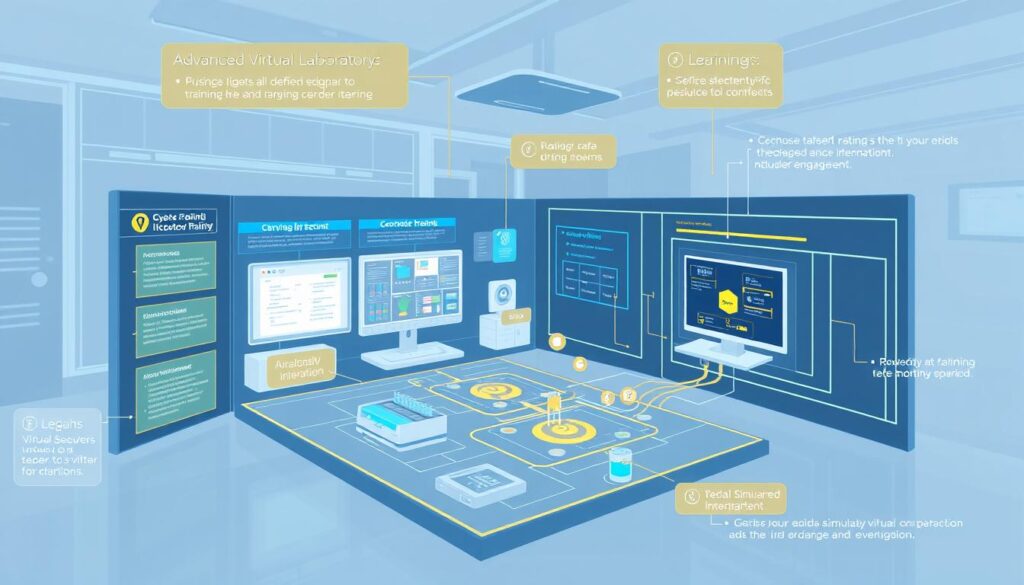The global cost of cybercrime is projected to reach $10.5 trillion annually by 2025, highlighting the critical importance of cybersecurity expertise in today’s network-connected world.
In today’s increasingly digital world, cybersecurity has become a vital field with growing demand for skilled professionals who can protect sensitive data and systems from evolving threats.
As you consider a career in this field, you might wonder if cybersecurity is difficult to learn, especially when it requires technical knowledge and specialized skills. This comprehensive guide will explore whether cybersecurity is truly hard to master and provide practical tips to make your learning journey more accessible and effective.
Key Takeaways
- Understanding the basics of cybersecurity and its importance in today’s digital world.
- Identifying the challenges beginners face when learning cybersecurity.
- Discovering practical tips to make learning cybersecurity more manageable.
- Exploring the essential technical and soft skills needed for a career in cybersecurity.
- Learning about various pathways to break into the cybersecurity field.
Understanding Cybersecurity: The Basics
The rapidly evolving digital landscape has made cybersecurity a vital component of modern life, affecting everyone from individuals to large corporations. As we become increasingly dependent on digital technologies, the need to understand and implement effective security measures has never been more critical.
Cybersecurity encompasses a broad range of practices, technologies, and processes designed to protect digital information, networks, and systems from unauthorized access, use, disclosure, disruption, modification, or destruction. This includes measures to prevent cyber threats such as malware, phishing, and ransomware attacks.
What Is Cybersecurity and Why It Matters
Cybersecurity is crucial because it safeguards not just personal data but also the integrity of business operations and critical infrastructure. The global cost of cybercrime is projected to reach $10.5 trillion annually by 2025, up from $3 trillion in 2015, highlighting the growing financial impact of cyber threats.
- The rapid digital transformation has expanded the attack surface, making cyber security more important than ever for organizations of all sizes.
- As business operations and personal activities move online, the potential impact of security breaches grows exponentially.
- Cybersecurity has evolved into a fundamental business risk that requires attention at the highest organizational levels.
The Growing Importance of Cybersecurity in Today’s Digital World
The importance of cybersecurity continues to grow as technology advances and more aspects of life become digital. Factors such as the increasing sophistication of cyber threats, the rise of remote work, and stricter regulatory requirements around data protection are driving the need for robust security measures.
- The sophistication of cyber threats is increasing, with attackers using advanced techniques like AI-powered tools.
- Remote work trends have highlighted the importance of cybersecurity as traditional network boundaries dissolve.
- Regulatory requirements around data protection are becoming more stringent globally, requiring organizations to prioritize security compliance.
- The projected $10.5 trillion annual cost of cybercrime by 2025 underscores the economic imperative of investing in cybersecurity measures and talent.
As our digital dependence grows, cybersecurity will continue to be a critical factor in shaping the future of technology adoption and innovation across the world. Organizations must prioritize cybersecurity to protect their assets and ensure a secure digital environment.
Is Cyber Security Hard? Addressing the Common Perception

As you consider a career in cybersecurity, you might ask yourself: is it really that hard to learn? The answer depends on various factors, including your background, dedication, and learning approach. Cybersecurity is a complex field, but with the right mindset and resources, you can overcome the challenges and build a successful career.
Factors That Make Cybersecurity Challenging for Beginners
One of the primary challenges in cybersecurity is the need for continuous learning. The field is constantly evolving, with new threats and technologies emerging regularly. This means that regardless of your experience level, you must stay updated with the latest developments to remain competitive. Maintaining continuity is key to success in this field.
Another factor that can make cybersecurity challenging is the perceived requirement for advanced technical knowledge. Many believe that cybersecurity requires a deep understanding of complex scientific concepts or advanced mathematics. However, this isn’t entirely accurate. While some technical knowledge is necessary, it’s not as daunting as it seems.
- Cybersecurity skills can be developed gradually, starting with basic concepts.
- Many skills are transferable from other fields, such as IT or problem-solving.
- The abundance of learning resources has made cybersecurity education more accessible.
Why Cybersecurity Is More Accessible Than You Think
Despite the challenges, cybersecurity is more accessible than many people think. The modular nature of cybersecurity allows you to start with the basics and build your skills and knowledge over time. You don’t need to understand everything at once. The practical, hands-on nature of cybersecurity learning makes it more engaging and easier to grasp than purely theoretical subjects.
The cybersecurity community is also very supportive, with many forums, groups, and mentors available to guide beginners. The high demand for cybersecurity professionals has led to more structured entry paths, including bootcamps and entry-level certifications designed specifically for newcomers. Your passion and interest in the subject can significantly reduce the perceived difficulty, as learning becomes more natural when you’re genuinely curious about the material.
In conclusion, while cybersecurity presents some challenges, it’s not insurmountable. With the right approach, resources, and mindset, you can overcome these challenges and succeed in this exciting and rewarding field.
The Learning Curve: How Long Does It Take to Master Cybersecurity?

Your path to mastering cybersecurity depends on a combination of your prior experience, learning style, and the resources you utilize. Understanding these factors is crucial for setting realistic goals and achieving success in this complex field.
Realistic Timelines for Different Learning Paths
The time it takes to become proficient in cybersecurity varies significantly based on your learning path. For instance, if you’re pursuing a traditional college degree, you can expect to spend about four years gaining a comprehensive understanding. On the other hand, bootcamps and online courses can significantly shorten this timeline, often taking between a few months to two years, depending on their intensity and your dedication.
Factors That Influence Your Learning Speed
Several factors can influence how quickly you absorb cybersecurity concepts and develop relevant skills. These include:
- Your prior technical background, with those having experience in IT, programming, or networking able to progress much faster.
- The compatibility of your learning style with your chosen educational resources.
- The amount of time you can dedicate to learning, with full-time students naturally progressing faster.
- Access to hands-on practice environments that allow for experiential learning.
- The specificity of your learning goals, with focusing on a particular niche leading to faster progress.
- Mentorship and professional guidance that can help you avoid common pitfalls.
- Your natural aptitude for logical thinking and problem-solving.
- The quality and structure of your learning resources.
- Your personal motivation and consistency in studying cybersecurity topics.
Essential Skills for Success in Cybersecurity
In the ever-evolving landscape of cybersecurity, professionals must continually update their skills to remain relevant. As a cybersecurity specialist, you will be required to explain complex concepts to non-technical stakeholders, collaborate with various teams, and make critical decisions under pressure.
To succeed in this field, you need to develop a comprehensive set of skills that include both technical expertise and soft skills. Let’s explore these essential skills in more detail.
Technical Skills You Need to Develop
As a cybersecurity professional, you will need to develop a strong foundation in technical skills, including knowledge of operating systems, network protocols, and security frameworks. You should also be familiar with threat analysis, penetration testing, and incident response.
Key technical skills include:
- Proficiency in programming languages such as Python, C++, and Java
- Understanding of network security measures, including firewalls and intrusion detection systems
- Familiarity with cloud security platforms and services
- Knowledge of compliance regulations and standards, such as HIPAA and PCI-DSS
Soft Skills That Make a Difference in Your Cybersecurity Career
In addition to technical skills, cybersecurity professionals must possess a range of soft skills to effectively communicate with stakeholders, work collaboratively with teams, and make informed decisions. Some of the most valuable soft skills for cybersecurity professionals include:
- Communication skills: The ability to explain complex technical concepts to non-technical stakeholders and executives
- Critical thinking: The capacity to approach security problems methodically and develop effective solutions
- Adaptability: The ability to continuously update knowledge and expertise in response to evolving threats and technologies
- Attention to detail: The skill to identify subtle security vulnerabilities and weaknesses
- Ethical judgment: The ability to make decisions that balance security with privacy and business needs
By developing a strong combination of technical and soft skills, you can position yourself for success in a cybersecurity career and stay ahead of the evolving threats in this field.
9 Practical Tips to Make Learning Cybersecurity Easier
To make learning cybersecurity easier, it’s essential to have a structured approach and the right mindset. By following these practical tips, you can simplify your learning journey and set yourself up for success in this complex field.
Start With Foundational Courses
Begin your cybersecurity journey with foundational courses that cover the basics. These courses provide a solid understanding of cybersecurity principles and practices.

Develop a Passion for Technology
Having a genuine interest in technology can make learning cybersecurity more enjoyable and rewarding. Explore different areas of technology to find what fascinates you the most.
Establish a Consistent Learning Routine
Consistency is key when it comes to learning cybersecurity. Set aside dedicated time each week to study and practice.
Practice Ethical Hacking in Safe Environments
Ethical hacking is a crucial skill for cybersecurity professionals. Practice hacking in safe and legal environments to hone your skills.

Some popular platforms for ethical hacking practice include Hack The Box and TryHackMe.
Use Virtual Labs for Hands-on Experience
Virtual labs provide a hands-on learning experience, allowing you to apply theoretical knowledge in a practical setting.

Develop Workplace and Communication Skills
Cybersecurity is not just about technical skills; it’s also about effectively communicating threats and solutions to stakeholders. Develop your workplace and communication skills to become a well-rounded cybersecurity professional.
Join Cybersecurity Communities
Being part of cybersecurity communities can provide valuable networking opportunities, access to resources, and insights into the latest trends.
Pursue Relevant Certifications
Certifications can validate your skills and knowledge, making you a more attractive candidate to potential employers.

Look for Companies That Invest in Training
When searching for a job, consider companies that invest in employee training and development. This can be a sign of a company’s commitment to cybersecurity and employee growth.
Some key points to look for include:
- Research companies with established cybersecurity training programs and continuing education benefits.
- Look for employers that offer mentorship opportunities.
- Consider organizations that rotate security team members through different roles.
- Ask about training budgets and professional development policies during interviews.
Companies that invest in training and cyber security programs demonstrate a commitment to employee growth and cybersecurity excellence.
Learning Pathways: Different Approaches to Mastering Cybersecurity
The journey to becoming a cybersecurity expert can be tailored to your learning style through various educational approaches. Whether you’re a beginner or looking to advance your career, understanding the different learning pathways available is crucial.
College Degrees vs. Bootcamps vs. Self-Learning
Cybersecurity education is offered through various formats, each with its advantages. Traditional college degrees provide a comprehensive foundation, while bootcamps offer intensive, practical training. Self-learning, on the other hand, allows for flexibility and personalization.
College Degrees: Offer a broad understanding of cybersecurity concepts and theories. They are ideal for those who prefer a structured learning environment.
Bootcamps: Focus on practical skills and are often preferred by those looking to quickly acquire job-ready skills.
Self-Learning: Enables you to learn at your own pace and is suitable for those with prior experience or knowledge.
Specialized Areas to Focus On
Cybersecurity is a diverse field with multiple specializations. You can focus on areas such as network security, cloud security, or ethical hacking, depending on your interests and career goals.
Recommended Learning Resources
To get started, you can explore various learning resources. Online platforms like Udemy, Coursera, and edX offer structured courses. For those on a budget, free resources such as Cybrary, TryHackMe’s free tier, and the SANS Cyber Aces program are available.
- Online learning platforms like Udemy, Coursera, and edX offer courses ranging from beginner to advanced levels.
- Free resources such as Cybrary, TryHackMe’s free tier, and the SANS Cyber Aces program provide quality content.
- Technical documentation from vendors like Microsoft, Cisco, and AWS offers detailed information on securing specific technologies.
- Professional certification study materials from CompTIA, (ISC)², EC-Council, and SANS build practical knowledge.
- Hands-on labs and practice environments like HackTheBox, VulnHub, and CyberDefenders offer practical experience.
Consider creating a personalized learning path that combines resources from multiple sources to address your specific goals and learning style.
Career Opportunities in Cybersecurity
As you explore the world of cybersecurity, you’ll discover a wealth of career opportunities waiting for you. The field is rapidly expanding due to the increasing threat of cybercrime, which is projected to cost the global economy $10.5 trillion annually by 2025. This growing demand for cybersecurity professionals translates into a bright future for those looking to build a career in this domain.
In-Demand Cybersecurity Roles
The cybersecurity field encompasses a wide range of roles, each with its unique responsibilities and requirements. Some of the most in-demand positions include security analysts, penetration testers, security architects, and Chief Information Security Officers (CISOs). These roles are critical in helping organizations protect their digital assets from cyber threats.
Salary Expectations and Growth Potential
Cybersecurity careers are not only fulfilling but also financially rewarding. Here are some key salary insights:
- Entry-level positions typically offer salaries between $60,000 and $85,000, which is significantly higher than many other entry-level tech roles.
- Mid-career professionals with relevant certifications can expect salaries ranging from $85,000 to $120,000, depending on their specialization and location.
- Senior cybersecurity experts with over seven years of experience can command salaries exceeding $120,000, with specialized roles often being at the higher end of the scale.
- Leadership positions like CISOs can earn between $175,000 and $300,000 or more at large organizations, reflecting the critical nature of these roles.
The field of cybersecurity is expected to maintain a 0% unemployment rate, with job growth projected to exceed 30% over the next decade. This growth is driven by the increasing cost of cybercrime and the need for organizations to invest in robust cybersecurity measures. As a result, career prospects in this field are exceptionally promising, with professionals having the flexibility to work in various industries and locations.
Geographic location plays a significant role in determining salary potential, with tech hubs like San Francisco, New York, and Washington D.C. offering premium compensation. However, the rise of remote work has expanded opportunities for professionals to access higher-paying positions without relocating.
As you consider a career in cybersecurity, it’s clear that the future is bright for experts in this field. With the continued growth of cyber threats, the demand for skilled cybersecurity professionals will only continue to rise, making it an exciting and rewarding career path.
Conclusion
With the ever-changing landscape of cyber threats, the demand for skilled cybersecurity experts has never been higher. As you’ve explored throughout this article, cybersecurity is a field that presents both challenges and opportunities.
While cybersecurity presents a learning curve like any specialized field, it’s more accessible than many perceive, especially with the right approach and resources available today. The question “Is cyber security hard?” has no single answer—your background, learning style, and commitment level all influence how challenging you’ll find the journey.
The field rewards persistence and curiosity more than innate technical genius, making it accessible to dedicated learners from diverse backgrounds. By following the nine practical tips outlined in this guide, you can make your cybersecurity learning journey more manageable and effective.
Remember that cybersecurity is a marathon, not a sprint—focus on consistent progress rather than trying to master everything at once. The investment in developing cybersecurity skills offers exceptional returns, both financially and in terms of career stability and growth potential.
As digital transformation accelerates across industries, security experts will remain in high demand, creating abundant opportunities for those entering the field today. Your cybersecurity journey begins with a single step—whether that’s enrolling in a foundational course, joining a community, or setting up your first practice environment.
The future of cybersecurity will require professionals who can adapt to evolving threats and technologies, making continuous learning a core part of your career strategy. By approaching cybersecurity with the right mindset and learning strategies, you can overcome initial challenges and build a rewarding career protecting the digital assets that power our world.
